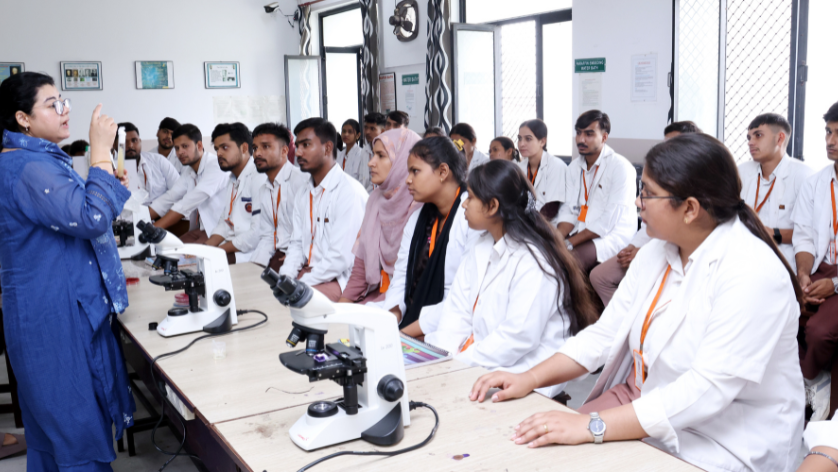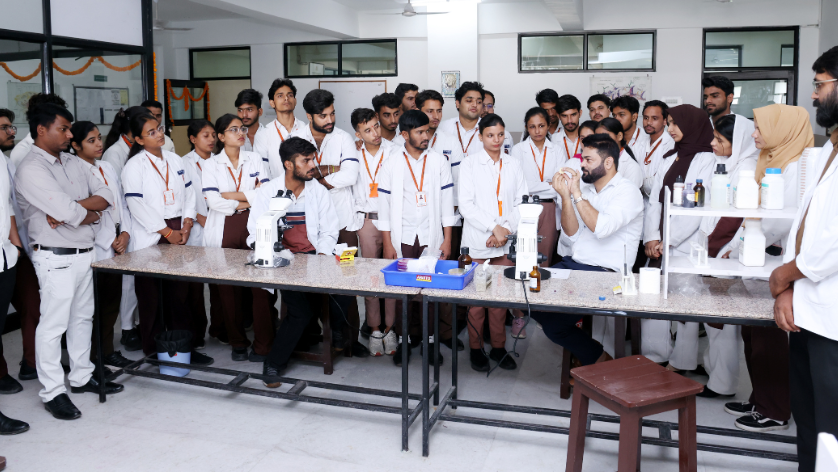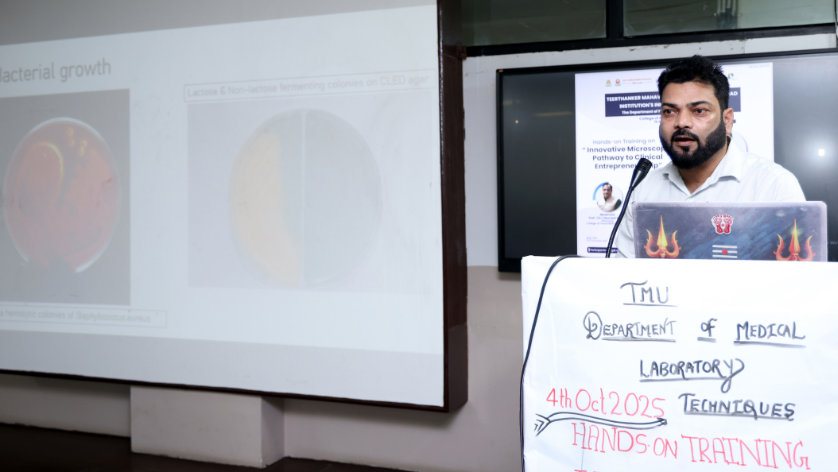TMU Conducts Hands-on Training in Innovative Microscopy for MLT Students
Moradabad, October 4, 2025:
The Department of Medical Laboratory Techniques, College of Paramedical Sciences, Teerthanker Mahaveer University, Moradabad, successfully conducted a one-day specialised training programme titled “Hands-on Training in Innovative Microscopy: Pathway to Clinical Entrepreneurship.” The workshop was held in Lab I and II of the Nursing Building (3rd Floor) and aimed to build students’ technical competence while fostering an entrepreneurial mindset in modern laboratory science.
Presence of Distinguished Guests
The session was graced by Prof. (Dr.) Umar Farooq, Head, Department of Microbiology, served as the Chief Guest. In his address, he encouraged students to set clear personal goals, stating that such clarity is essential for mastering bacterial identification and laboratory proficiency.
The workshop also witnessed the presence of Principal Prof. (Dr.) Navneet Kumar, Prof. (Dr.) Ruchi Kant (Head, Department of Medical Laboratory Techniques), and several faculty members from allied departments, who extended their support and motivation to the participants.
Inauguration and Programme Objective
The event commenced under the leadership of Prof. (Dr.) Navneet Kumar and Prof. (Dr.) Ruchi Kant, who highlighted the significance of integrating advanced laboratory techniques into medical science education. They emphasised that hands-on learning is vital for strengthening diagnostic skills and preparing future-ready laboratory professionals.
Guest Speaker Dr Imran Ahmad (Associate Professor) conducted the core training session, delivering an expert and engaging lecture. A total of 165 students from the B.Sc. and M.Sc. Medical Laboratory Technology, along with faculty members, actively participated.
The objective of the training was to enhance competencies in diagnostic microscopy, microbial identification, result interpretation, and clinical decision-making.
Major Activities of the Workshop
The workshop combined theoretical knowledge with practical exposure, enabling students to observe, interpret, and apply microbiological techniques used in clinical diagnostic laboratories.
1. Identification of Bacteria by Gram Staining
Students received a live demonstration of the Gram Staining method.
Key learnings included:
- Differentiation of bacteria into Gram-positive (purple) and Gram-negative (pink).
- Understanding structural differences in bacterial cell walls.
- The significance of crystal violet and safranin dyes.
This session provided foundational insights into microbial diversity and diagnostic microbiology.
2. Observation of Bacterial Growth on Culture Media
Participants examined bacterial colonies grown on Blood Agar, MacConkey Agar, and CLED Agar.
- They observed haemolysis patterns on Blood Agar.
- Identified lactose-fermenting (pink) and non-lactose-fermenting (blue) colonies on MacConkey Agar.
- Understood the diagnostic value of culture media in clinical laboratories.
The hands-on exposure demonstrated how standard culture techniques form the basis of pathogen identification.
3. Testing Bacterial Motility Using the Hanging Drop Technique
Students learned the Hanging Drop Technique to determine bacterial motility:
- Slides were examined under a 10x objective lens.
- They observed live bacterial movement.
- Instructors explained the role of flagella and motility in classification and infection analysis.
4. Identification of Fungi Through SDA Medium Observation
The fungal identification session covered growth observation on Sabouraud’s Dextrose Agar (SDA).
- Students analysed colonies of Candida, Aspergillus, and other fungi.
- They observed colour, texture, and morphological differences.
- Wet Mount Preparation helped them identify budding cells and hyphae.
This activity introduced the fundamentals of Medical Mycology.
5. Preparation of Permanent Slides
The final demonstration focused on Permanent Slide Preparation:
- Students learned sample mounting, fixing, and staining techniques.
- The practice highlighted the importance of proper documentation and sample preservation in laboratory settings.
Impact and Academic Significance
This hands-on training bridged the gap between theoretical teaching and practical application. Students gained:
- Enhanced diagnostic interpretation skills
- Understanding of pathogen identification
- Improved analytical and scientific thinking
- Exposure to modern laboratory safety and infection control practices
The session inspired participants to pursue innovation, research, and entrepreneurship within the field of clinical laboratory sciences.
Vote of Thanks
Special acknowledgement was extended to the Microbiology Team for providing technical assistance. The organising committee, including Mrs Shikha Paliwal, Dr Shivsharan Singh, Dr Varsha Rajput, Dr Archana Jain, Mr Shivam Agarwal, Mr Baijnath Das, Ms Sakshi Bisht, Mr Saurabh Singh Bisht, Mr. Amit Bisht (HoD, R.I.T.), and Mr Yogesh Kumar, ensured seamless coordination.
Anchoring was efficiently carried out by Ayush and Vantika.
The committee expressed gratitude to Dr Imran Ahmad, Dr Fariha Hasan, Dr Shubhi Singh, resident doctors Dr Mayank, Ms Babli, and Dr Rohit, as well as technical staff members Mr Deependra Kumar and Mr Vipin Kumar, for their invaluable support.
In the concluding address, Convener Prof. (Dr.) Ruchi Kant thanked all guests, participants, and team members for contributing to the event's success.
Conclusion
The training programme marked a significant milestone in TMU’s commitment to enhancing practical proficiency, scientific temper, and entrepreneurial thinking among its students. Through hands-on exposure, expert guidance, and innovative demonstrations, the event strengthened students’ readiness for the healthcare sector and reaffirmed TMU’s dedication to academic excellence and clinical innovation.













